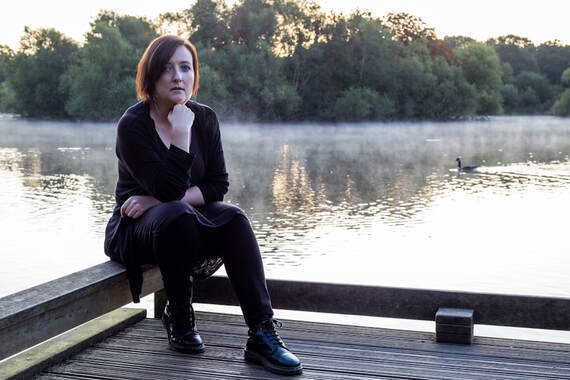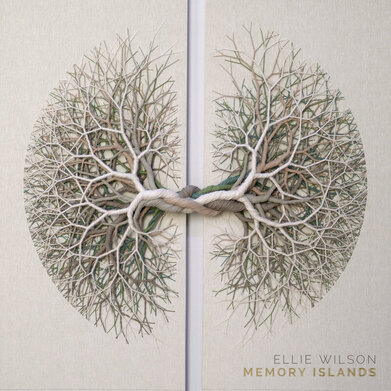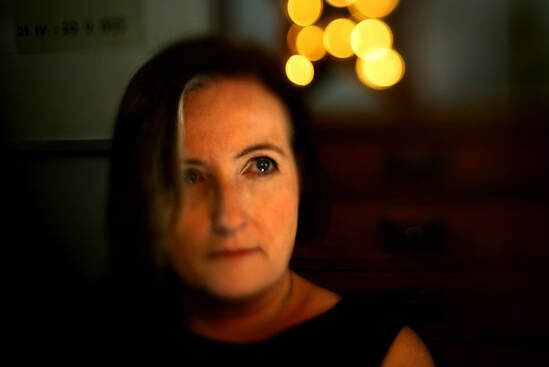Klanglandschaften
“Memory Islands” is the new album by British violinist Ellie Wilson. Topics such as lost and fragmented memories, as well as traces of the past, are acoustically processed. It's coming autumn, a lot of things are now quieter and moving a little slower. In a conversation, the composer introduces herself in more detail and shares interesting impressions about the creation of the new work.
 Ellie Wilson at Epping Forest (Photo: Michelle Foulser)
Ellie Wilson at Epping Forest (Photo: Michelle Foulser)
Hello Ellie, how are you?
I’m good, thanks. Just sitting in my kitchen with a coffee, peanut butter on toast and enjoying some autumn sunshine.
Your new album “Memory Islands” will be released at the end of September. Are you a little
nervous or is it just routine for you?
I wouldn’t say it’s just routine; releasing anything you’ve spent a huge amount of time and energy on is a big deal, but the idea of putting music out there for people to listen to doesn’t scare me. I’m excited!
Tell a little bit about your musical past. How did you get into music?
There was always rock music playing in the house when I was a kid. My parents were into prog bands like ELO, Moody Blues, and Genesis and I’m told I liked dancing around the living room to it when I was really young. My grandad (not the one featured on my album) loved classical music and I borrowed lots of his vinyl and really got into it. I must only have been about seven because that was when I started learning the violin. It was the first instrument we were offered at primary school but I would have said yes to anything. I wonder how my life would have panned out had I picked the flute or the trumpet. I played in orchestras, did solo Vivaldi recitals in churches, but then I’d be listening to Sonic Youth, Nirvana and the Pixies or going to gigs in Camden. I studied music at university, but I was never interested (or probably good enough) to play in an orchestra, and then …
When and how did you decide to make music and what genre do you want to go into?
… I saw Godspeed You! Black Emperor and it was a revelation. They combined everything I loved about music, so I bought an electric violin and some guitar pedals and formed a post-rock band called Detwiije with people I met via MySpace. We did a couple of albums and toured around the UK in tatty old vans. It was brilliant and I felt like I’d met my gang of like-minded people. I then played for many years in a band called REVERE, made a few more albums, played loads of big festivals and toured in Europe. More recently I was in English folk group Stick In The Wheel, which immersed me in another wonderful genre. I spent years collaborating with other musicians and it’s only more recently that I have focused on being a solo artist and composer and started to discover what 100% Ellie Wilson sounds like. I think my album Memory Islands shows that musical journey as I draw on a variety of influences and styles.
Can you remember the very first song you wrote? Describe it a little.
Well, I’ve never really been good with words. My solo music is mainly instrumental. The only proper song I’ve ever written was for a project I did a few years ago about Epping Forest. It was a folk song called The Lopper and The Landgrabber, which told the story of an ancestor of mine called Thomas Willingale; a local labourer who was influential in saving the Forest from Enclosure in the mid-1800s. My first ever piece was for GCSE Music when I was fifteen, a short lyrical composition for violin and piano.
You were artist in residence for Epping Forest. Would you describe this project a little?
Epping Forest is huge ancient woodland that stretches from East London out into the county of Essex. I grew up right next to it. I composed music inspired by the human impact on Epping Forest through the centuries: Iron-Age hillforts, WWII bomb craters that are now ponds and my 5 x Great Uncle Thomas Willingale. It ended up as a sound installation - field recordings (including hydrophones picking up sounds in ponds) folk tunes, glitchy electronica and dark drones – which visitors to the Forest could experience by picking up a set of headphones and walking off into the woodland. Echoes: Unearthing Stories of the Forest can be found on my bandcamp page and all the usual DSPs.
I’m good, thanks. Just sitting in my kitchen with a coffee, peanut butter on toast and enjoying some autumn sunshine.
Your new album “Memory Islands” will be released at the end of September. Are you a little
nervous or is it just routine for you?
I wouldn’t say it’s just routine; releasing anything you’ve spent a huge amount of time and energy on is a big deal, but the idea of putting music out there for people to listen to doesn’t scare me. I’m excited!
Tell a little bit about your musical past. How did you get into music?
There was always rock music playing in the house when I was a kid. My parents were into prog bands like ELO, Moody Blues, and Genesis and I’m told I liked dancing around the living room to it when I was really young. My grandad (not the one featured on my album) loved classical music and I borrowed lots of his vinyl and really got into it. I must only have been about seven because that was when I started learning the violin. It was the first instrument we were offered at primary school but I would have said yes to anything. I wonder how my life would have panned out had I picked the flute or the trumpet. I played in orchestras, did solo Vivaldi recitals in churches, but then I’d be listening to Sonic Youth, Nirvana and the Pixies or going to gigs in Camden. I studied music at university, but I was never interested (or probably good enough) to play in an orchestra, and then …
When and how did you decide to make music and what genre do you want to go into?
… I saw Godspeed You! Black Emperor and it was a revelation. They combined everything I loved about music, so I bought an electric violin and some guitar pedals and formed a post-rock band called Detwiije with people I met via MySpace. We did a couple of albums and toured around the UK in tatty old vans. It was brilliant and I felt like I’d met my gang of like-minded people. I then played for many years in a band called REVERE, made a few more albums, played loads of big festivals and toured in Europe. More recently I was in English folk group Stick In The Wheel, which immersed me in another wonderful genre. I spent years collaborating with other musicians and it’s only more recently that I have focused on being a solo artist and composer and started to discover what 100% Ellie Wilson sounds like. I think my album Memory Islands shows that musical journey as I draw on a variety of influences and styles.
Can you remember the very first song you wrote? Describe it a little.
Well, I’ve never really been good with words. My solo music is mainly instrumental. The only proper song I’ve ever written was for a project I did a few years ago about Epping Forest. It was a folk song called The Lopper and The Landgrabber, which told the story of an ancestor of mine called Thomas Willingale; a local labourer who was influential in saving the Forest from Enclosure in the mid-1800s. My first ever piece was for GCSE Music when I was fifteen, a short lyrical composition for violin and piano.
You were artist in residence for Epping Forest. Would you describe this project a little?
Epping Forest is huge ancient woodland that stretches from East London out into the county of Essex. I grew up right next to it. I composed music inspired by the human impact on Epping Forest through the centuries: Iron-Age hillforts, WWII bomb craters that are now ponds and my 5 x Great Uncle Thomas Willingale. It ended up as a sound installation - field recordings (including hydrophones picking up sounds in ponds) folk tunes, glitchy electronica and dark drones – which visitors to the Forest could experience by picking up a set of headphones and walking off into the woodland. Echoes: Unearthing Stories of the Forest can be found on my bandcamp page and all the usual DSPs.
All my memories, the good and the bad, make me who I am
 Janaina Mello Landini designed the album cover.
Janaina Mello Landini designed the album cover.
Let's talk about your new album. The first thing you notice is the beautiful artwork by Janaina Mello Landini. Tell us something about it?
Janaina is an artist from Brazil who I've followed on Instagram for some time but never met. I sent her an email and she kindly said yes to me using her work Ciclotrama 301 (superstrato) on the cover. Social media can be great sometimes!
I love her work and the cover image is so striking. It fits perfectly with the theme of my album, which explores the strange landscape of memory.
You are a trained violinist. What makes this instrument so special in your opinion?
It is so versatile. You can play anything on it – jazz, folk, classical, rock. It can be lyrical, rhythmic, soft, loud, gritty and beautiful.
The music on this album explores themes of lost and fragmented memories. What are your best memories and which ones are so fragmented that you would like to forget them?
My friend, Dr Andrew Thompson, is a cognitive neurologist and wrote a great introduction in my album liner notes. Always good to have a specialist on hand to help explain things! ‘Our memories – complex and fragmented and unreliable as they can be – are fundamental to who we each are as human beings. It is through the lens of our memories that we see, and process, and understand everything that happens to us. They give the events of our lives context and meaning. It is not just a simple mental list of our experiences that does that. It is the emotions that are inextricably tangled through them’. So, I guess, all my memories, the good and the bad, make me who I am. I do find I bury bad memories really deep and then start to process them years later, once I don’t feel so hurt or emotionally attached to the experience. As for good memories, I have loads of them, thankfully!
In fact, the album is a picture of good and not so good memories. Acoustically expressed in romantic and stirring pieces. Which title did you have to work on for a long time until it was perfect for you?
The theme for my album was decided right at the start and the title came from an essay I read online about the how the brain works, something I was particularly fascinated by after watching my father’s recovery from a coma (see track Delta). Despite my works not having lyrics, I find titles come to me relatively easily because each piece has a story or concept.
Which title of the seven tracks from the album is particularly close to your heart and why?
I'm guessing "By The Time I Got Back Pt.1", right? Yes. My grandad rarely talked about his experiences in WW2. I was still quite young when he died and I’m sad that I never had the chance to have more mature conversations with him. His closing words on this track get me every time and are a poignant reminder of the sacrifice made by so many young people of his generation “by the time I got back I was in my twenty-ninth year, The young years of my married life were wasted. And that was my lot!” I do wonder what he’d make of me using his voice like this – probably a bit bemused by the fuss but hopefully pleased and a bit proud.
The title "Unnamed Unseen" is such a typical example of timeless sound art. How much heart and soul is there in such pieces of yourself?
I wrote this during the pandemic. I was reading Robert Macfarlane’s book Landmarks and I was heavily pregnant. It was the first piece I composed on hardanger fiddle, a beautiful folk instrument from Norway. Mine has four strings that are played like a violin and four sympathetic strings that sit underneath them and resonate under their influence. This creates a shimmering, reverb-like sound. The bridge is wider and fingerboard less curved to make it easier to play two strings at the same time (double stopping) - perfect for drones and choppy rhythms. Unnamed Unseen is inspired by a line from Landmarks about nature words falling out of our language: ‘Once they go unnamed they go to some degree unseen. Language deficit leads to attention deficit.’
Which track on the album challenged you the most until you were completely satisfied?
Probably Mindpop. The main motif throughout (nicknamed the ‘choir of angels’) is the violin played through a TC Helicon VoiceLive. It almost didn’t make the album because it is so different from the other tracks, but I felt it made a statement and with the help of my producer (and partner) Thom Ashworth and additional knob twiddling from my friend and musical collaborator Jay Chakravorty we go it to the place I wanted.
Do you already have ideas for a follow-up project?
I’ve got a couple of new tracks bubbling away and I’m developing an idea for a sound installation as part of a composer scheme I’m on with Oxford Contemporary Music (OCM).
Since becoming a mum it’s not been as easy to tour
 The British violinist Ellie Wilson. (Photo: Thom Ashworth)
The British violinist Ellie Wilson. (Photo: Thom Ashworth)
What does Ellie Wilson do when she’s not writing music or is in the studio?
Run around after my two-year-old son, which involves a lot of roaring like a dinosaur! I also enjoy gardening (it’s a great way to switch off) and being by the sea.
Which music or artists/bands do you personally really like listening to at the moment?
Maybe I’m mellowing as I get older but music I listen to now tends to be more meditative and instrumental. I still love a bit of 90s indie/alt rock and never tire from old favourites like Nick Cave, Radiohead, King Crimson, 65daysofstatic but recently I’ve been listening to S. Carey, Linda Buckley, Richard Skelton, Jessica Moss, Missy Mazzoli and Anna Thorvaldsdottir.
What advice would you give to young people who are talented and like composing music, but don't dare to publish their music because they think they're too bad or no one will listen anyway?
The most important thing is to get your music out there. Create music that is true to you and not what you think others want to hear. There is an audience and a community of like-minded musicians for even the most niche of musical styles. Always remember, all musicians, even ones you think are established, suffer from imposter syndrome, mess up on stage, scrap songs and works in progress, have that feeling of dread when faced with a blank manuscript page or a commission deadline and struggle balancing music admin/life alongside being creative.
You have toured the UK and Europe with various post-rock/folk bands. What does it mean to you to be on stage in front of an audience?
Since becoming a mum it’s not been as easy to tour. I don’t miss the travelling, but I do miss being on stage with bands, making a racket, having fun and chatting to the audience afterwards. I’m currently working on a solo live set and plan to start gigging next year.
Thank you Ellie, the last words are yours.
Thanks for the great questions and lovely album review, Andre. I’m going to be in Germany next month performing with Jay Chakravorty (Feinkost Lampe, Hannover, 16 November). Check out his music for piano, synths and strings!
The interview was conducted by André Schönaue
Links to Ellie Wilson:
|
Memory Islands on Bandcamp:
|
